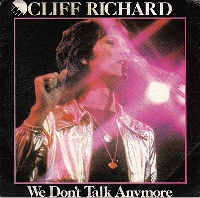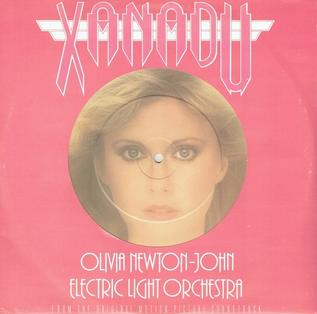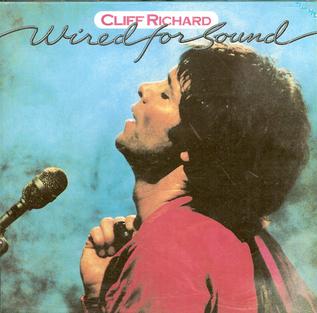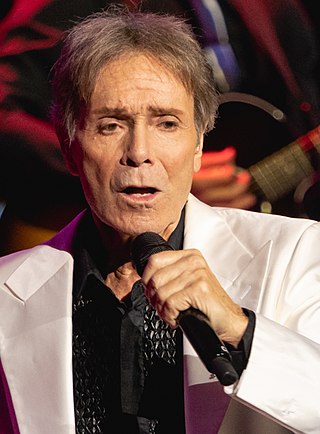
"Funkytown" is a song by American disco-funk group Lipps Inc., released by Casablanca Records in March 1980. It was written and produced by Steven Greenberg and released as the second single from the group's debut studio album, Mouth to Mouth (1979).

"All Night Long (All Night)" is a hit single by American singer and songwriter Lionel Richie from 1983. Taken from his second solo album, Can't Slow Down (1983), it combined Richie's soulful Commodores style with Caribbean influences. This single reached number one on three Billboard charts (pop, R&B and adult contemporary). In the UK, it peaked at number two on the singles chart.
"This Ole House" is an American popular song written by Stuart Hamblen, and published in 1954. Rosemary Clooney's version reached the top of the popular music charts in both the US and the UK in 1954. The song again topped the UK chart in 1981 in a recording by Shakin' Stevens.
"Blue Turns to Grey" is a song that was written by Mick Jagger and Keith Richards. The song first appeared in February 1965 when both Dick and Dee Dee and The Mighty Avengers released versions of it as singles. Another version was released shortly thereafter by Tracey Dey on Amy Records. On Dey's single, the label credits the song to "K. Richard-A. Oldham"—Oldham being the surname of the Rolling Stones' then-manager/producer Andrew Loog Oldham. It was released by The Rolling Stones on their 1965 US-only album December's Children later that year. On this album, "Blue Turns to Grey" as well as "The Singer Not the Song" features Brian Jones on a 12-string electric guitar and Keith on a 6-string. It did not see a UK release until the 1971 compilation album Stone Age.

"We Don't Talk Anymore" is a song recorded by Cliff Richard that reached number one in the UK Singles Chart in August 1979, remaining there for four weeks. Produced by the Shadows' rhythm guitarist, Bruce Welch, and written by Alan Tarney, it was Richard's tenth UK number one and his first since "Congratulations" in 1968.

"Woman in Love" is a song performed by Barbra Streisand and taken from her 1980 album, Guilty. The song was written by Barry and Robin Gibb of the Bee Gees, who received the 1980 Ivor Novello award for Best Song Musically and Lyrically. It is her fourth of four Platinum records, and is considered her greatest international hit.

"Living Doll" is a song written by Lionel Bart made popular by Cliff Richard and the Shadows in 1959. It was the top selling single in the UK in 1959. It has topped the UK charts twice: in its original version in 1959 and a new version recorded in 1986 in aid of Comic Relief. It is one of the few songs released by an English singer to chart on the American Billboard charts before the British Invasion occurred.

"Xanadu" is the title song from the soundtrack of the 1980 film Xanadu. Written by Jeff Lynne of the English rock band Electric Light Orchestra (ELO), the song is performed by English-born Australian singer, songwriter and actress Olivia Newton-John, with Lynne adding parenthetic vocals in the style of his other songs on the Xanadu soundtrack, and ELO providing the instrumentation. It was Lynne's least favourite of his own songs. "Xanadu" reached number one in several countries and was the band's only UK number-one single, when it peaked there for two weeks in July 1980. It was certified silver by the British Phonographic Industry. It also peaked at number eight on the US Billboard Hot 100.

"The Twelfth of Never" is a popular song written in 1956 and first recorded by Johnny Mathis the following year. The title is a popular expression, which is used as the date of a future occurrence that will never come to pass. In the case of the song, "the 12th of Never" is given as the date on which the singer will stop loving his beloved, thus indicating that he will always love her.

"Rock Your Baby" is the debut single by George McCrae. Written and produced by Harry Wayne Casey and Richard Finch of KC and the Sunshine Band, "Rock Your Baby" was one of the landmark recordings of early disco music. A massive international hit, the song reached number one on the Hot 100 in the United States, spending two weeks there in July 1974; number one on the R&B chart; and number one on the UK Singles Chart, spending three weeks at the top in July 1974. Having sold 11 million copies, it is one of fewer than 40 all-time singles to have sold 10 million physical copies worldwide.

"Conga" is the first hit single released by the American band Miami Sound Machine, led by Gloria Estefan, on their second English-language album, Primitive Love. The song was written by the band's drummer and lead songwriter Enrique Garcia. The song first appeared on August 31, 1985, as part of the album. The single was released in Australia on September 9, 1985.

"Power to All Our Friends" is a song by Cliff Richard which was chosen as the British entry to the Eurovision Song Contest 1973, by a postal vote which was decided by BBC viewers after Richard performed six contending songs on A Song For Europe, featured on Cilla Black's BBC1 Saturday evening show Cilla. The runner-up song was "Come Back Billie Jo", written by Mitch Murray and Tony Macaulay, which was included as the B-side on the single. "Power to All Our Friends" came third in the Eurovision Song Contest.

Wired for Sound is the 24th studio album by Cliff Richard, released in September 1981. The album peaked at number 4 in the UK album charts upon release, and spent a total of 25 weeks on the chart in 1981–82. The album was certified Platinum by the BPI, and achieved global sales of over one million.

"Some People" is a song by English singer Cliff Richard, released in August 1987 as the second single from his 1987 studio album, Always Guaranteed. The song reached number three on the UK Singles Chart and was certified silver by the British Phonographic Industry (BPI) for shipments over 250,000. The song reached the top 10 in several other countries as well.

"Miss You Nights" is a song written by Dave Townsend and made famous worldwide by Cliff Richard. The song has been recorded by numerous other artists, most notably Westlife, who released it as the second track on a double A-side single in 2003. The Westlife single reached number 3 in the UK singles chart.
"Daddy's Home" is a famous song by American doo-wop group Shep and the Limelites. The song was written by the three members of the band, James "Shep" Sheppard (1935–1970), Clarence Bassett (1936–2005) and Charles Baskerville. The group recorded the original version of "Daddy's Home" on February 1, 1961, and it was released on Hull Records in March 1961 with the B-side being "This I Know".

"Dreamin'" is a song recorded by Cliff Richard from his 1980 album, I'm No Hero. The track was the first of three singles released and was the biggest hit from the album, becoming a top-ten hit in numerous countries including the UK and the US where it became his third and last top ten hit.

"A Little in Love" is a song recorded by Cliff Richard, released as the second single from his 1980 album, I'm No Hero.

The albums discography of English singer Cliff Richard consists of 48 studio albums, seven soundtrack albums, 11 live albums, three cast recording albums, 17 mainstream compilation albums, one remix album, 12 box sets, eight gospel compilation albums and 47 EPs. It also includes numerous budget/mid-price compilation albums, repackaged albums, and foreign compilation albums.

The singles discography of English singer Cliff Richard consists in excess of 200 singles, of which 159 singles have been released in the UK in varying vinyl, CD, cassette and digital formats. Listed alongside the UK singles in the discography below are a further 20 singles which were released in other territories, as well as 22 singles which were sung in German and only released in German-speaking countries.

















